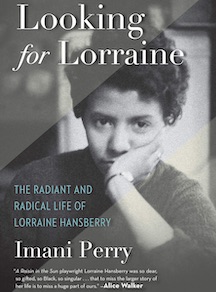By Jordan Willson
Looking for Lorraine: The Radiant and Radical Life of Lorraine Hansberry, a biography written by Imani Perry, is the recipient of ΦBK’s 2019 Christian Gauss Award. The award was established in 1950 to recognize works in literary scholarship or criticism, and it honors the late Christian Gauss, who once served as President of The Phi Beta Kappa Society.
The Hughes-Rogers Professor of African American Studies at Princeton University, Perry is an interdisciplinary scholar of race, law, literature, and African American culture. In both teaching and writing, Perry often takes on timely and complicated issues including the intersection of race and politics in America and contemporary discussions on feminism and patriarchy.
Thus far, Perry has written six books: Prophets of the Hood: Politics and Poetics in Hip Hop (2004); More Beautiful and More Terrible: The Embrace and Transcendence of Racial Inequality in the United States (2011); Vexy Thing: On Gender and Liberation (2018); May We Forever Stand: A History of the Black National Anthem (2018), nominated an outstanding literary work at the 50th NAACP Image Awards; Looking for Lorraine: The Radiant and Radical Life of Lorraine Hansberry (2018); and most recently, Breathe: A Letter to My Sons (2019).
Looking for Lorraine is not only the winner of the Christian Gauss Award but the 2019 PEN/Jacqueline Bograd Weld Award for Biography as well. The biography was also a New York Times Notable Book of 2018, a Black Caucus of the American Library Association Honor Book for Nonfiction, a finalist for the Lambda Literary Award for LGBTQ Nonfiction, a 2019 Pauli Murray Book Prize finalist, and a Triangle Award finalist.
Looking for Lorraine details the life of Lorraine Hansberry, who although was best-known for her work A Raisin in the Sun, also had an unwavering commitment to social justice. Perry’s biography brings to light Hansberry’s life full of extraordinary experiences and achievements including challenging President Kennedy and his brother to take bolder stances on Civil Rights, supporting African anti-colonial leaders, confronting the romantic racism of Beat poets and Village hipsters, and joining one of the nation’s first lesbian organizations.
Judges for the PEN/Jacqueline Bograd Weld Award said of the book, “Perry approaches her subject with both empathy and a sharp, critical eye; this is a biography that exercises several muscles at once. Perry’s sentences are intimate, warm and crisp; in considering Hansberry in all of her prismatic multiplicities, Perry has written a singular book.”
INTERVIEW
Having taken on countless important issues that many consider difficult to talk about, what is it that especially inspired you to choose this woman, Lorraine Hansberry, to write about?
PERRY: Hansberry was an extraordinary person, a groundbreaking playwright, and an intellectual and activist with historic importance and yet someone who had not been adequately written about. I wanted to give her her rightful place in history and give readers an opportunity to find inspiration in her life.
Hansberry wrote one of the most widely read, taught, and produced plays by a black writer in history, A Raisin in the Sun. How has this single work shaped the way people think of her?
PERRY: On the one hand, the play is a masterpiece, as evidenced by the three film versions and constant revivals. It has an iconic status in American theater. On the other hand, the play has often seemed to eclipse the playwright and the full body of her work. I hope that this book and the stunning documentary, Sighted Eyes, Feeling Heart, bring her to stand alongside her work in the public consciousness.
How does your book address our somewhat myopic view of Hansberry as a literary figure and an intellectual and develop Hansberry as more than just the writer of A Raisin in the Sun?
PERRY: One of the great joys of writing is found in composition. I loved that I could write about Hansberry as a writer, a painter, a radical, a lover all at once. She was so gifted and layered a person that she deserves to be remembered as such.
What would you say are some of the most important or surprising discoveries you made in your research for the book? What was the most exciting?
PERRY: There are so many beautiful writings by Hansberry that I didn’t have access to before reading her archives. It was an absolute joy to read her unpublished work.
You have said you consider this book less a biography than a genre that has yet to be named. What genres might this book combine, and what do you think makes it different than a biography?
PERRY: I referred to the book as a third person memoir, devoted to sharing a sense of her life’s journey, character, and intellect, rather than a comprehensive biography. This required that I distill and illuminate. It was also a method that allowed me to share a good deal about mid 20th century social and cultural history.
Can you share your response to winning the Christian Gauss Award from Phi Beta Kappa?
PERRY: I was elated. It is such an honor to receive the award, especially as it is named after a Princeton University faculty member.
Jordan Willson is a recent graduate of the University of Idaho with a degree in journalism. The University of Idaho is home to the Alpha of Idaho chapter of Phi Beta Kappa.




